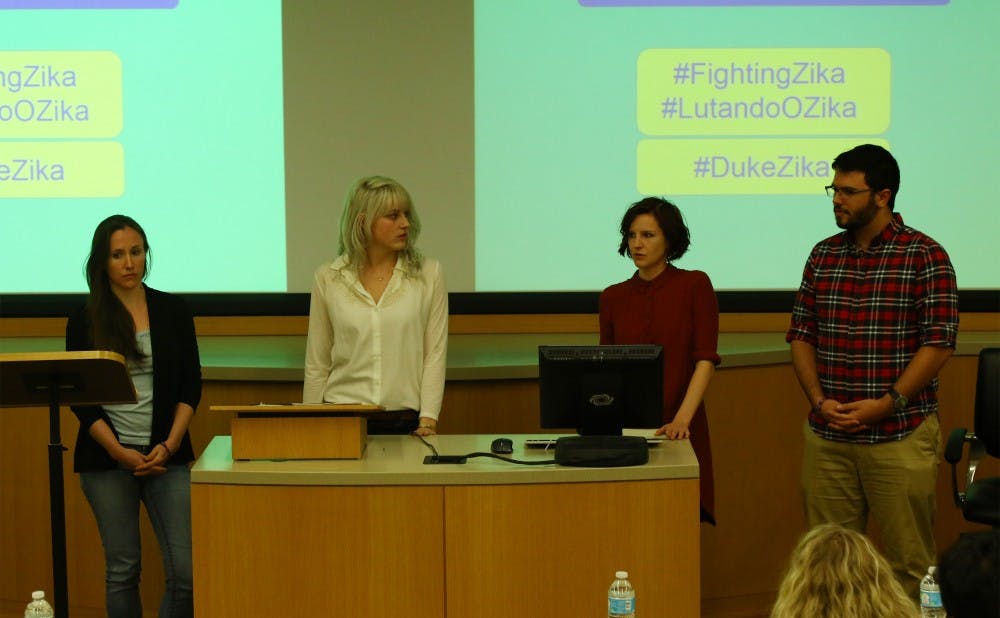Student teams presented proposals to combat the spread of the Zika virus Wednesday evening.
The event, held at the Fuqua School of Business, was the conclusion of the week-long Zika Innovation Challenge in which students developed potential solutions and learned from leading experts in the field. The winning team proposed using social media platforms to alert travelers to the disease and its risks. The group will present their idea Friday to the Alliances and Incentives in the Era of Outbreaks Symposium and eventually to the U.S. Agency for International Development’s Center for Accelerating Impact and Innovation.
“We’re all freshmen,” said freshman Gary Wang, a member of the winning team. “We’ve never had this kind of platform before, and for Duke to invest in our idea and to believe in it and to potentially make it into something that’s implementable—that’s really exciting for us.”
Wang—along with freshmen Francia Fang, Howard Li, Michael Li and Jackie Xu—suggested monitoring the disease through social media during and after the 2016 Summer Olympic games in Rio De Janeiro, which are expected to draw at least 500,000 international visitors. Their plan would warn travelers who make posts from Brazil, direct them to get tested and take a survey that researchers can use to identify risk factors and alert local public health agencies.
Overall, 110 students registered for the seven-day program. Nine experts led workshops and gave speeches about public health solutions to get the teams going. Fourteen teams submitted solutions, of which six were selected to be finalists that presented Wednesday.
Other teams planned to distribute kits to vulnerable communities, to use mathematical models to predict the size of mosquito populations and to provide women with reproductive health services.
Several teams also proposed using biological solutions to combat the spread of the virus, including copepods, which are small crustaceans found in the sea, and bacteria. The projects were judged by public health and policy experts from Duke and the community.
“The teams were spectacular and just seeing all the ideas they brought to bear and how they collaborated with students from other disciplines was really impressive,” said Kimberly Langsam, research evaluation and student engagement program director at the University’s Social Entrepreneurship Accelerator at Duke. “I think a lot of people jump to solutions, but they really did the groundwork to understand the challenge landscape.”
Langsam emphasized the need to engage diverse groups of students in combatting the virus.
“The goal here is really for your benefit or learning,” she said. “It’s not often that we have these opportunities to all come together and work towards something really important.”
Scientists have been working to develop solutions to the mosquito-borne virus, which causes fever, rashes and muscle and joint pains. Some experts are concerned that contracting the virus during pregnancy leads to fetal development problems and an increased risk of microcephaly, a birth defect in which a baby’s head is smaller than normal, though the link has not been confirmed.
Most teams focused their solutions on Brazil, which was the starting point for the recent outbreak of the disease. The country has begun using 220,000 military personnel to curb Zika’s spread, representing the largest operation in its history.
The competition was modeled after the Duke Ebola Innovation Challenge last year, which was sponsored by SEAD and generated much student interest, Langsam said.
“We thought it was very successful, and so when the opportunity came up to bring students together around Zika, we thought we should take advantage of it,” she explained.
The competition was sponsored by SEAD, the Center for Advancement of Social Entrepreneurship, the Duke Innovation and Entrepreneurship Initiative and the Duke Global Health Institute.
Fang noted that she is looking forward to potentially implementing her group’s proposal.
“We didn’t want to get too hopeful, but now we’re just kind of past that first step,” she said. “It’s definitely more likely than it was last night.”
Another effort to combat the Zika virus will be held Friday, when The Alliances and Incentives in the Era of Outbreaks symposium occurs in McClendon 5 from 8.30 a.m. to 4.30 p.m. It will feature speakers from a variety of public health backgrounds discussing strategies to fight infectious diseases, including representatives from GlaxoSmithKline Biologicals, a pharmaceutical company, the Bill and Melinda Gates Foundation and the U.S. Department of Health and Human Services.
Get The Chronicle straight to your inbox
Signup for our weekly newsletter. Cancel at any time.
Adam Beyer is a senior public policy major and is The Chronicle's Digital Strategy Team director.

